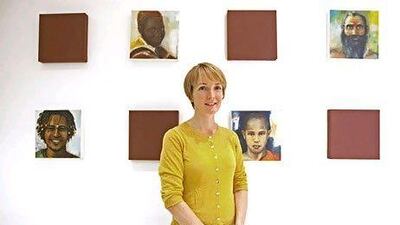Jeanette McKenna, a community investment manager at Standard Chartered Bank in the UK and head of the company's Seeing is Believing programme, always considered herself a charitable person. But Miss Mckenna, who regularly visits the UAE on business, says a trip through east Africa opened her eyes to the ways small donations can transform lives and helped shape her career path.
Are you a spender or a saver?
I'm a saver, but I splash out once in a while when I think something is worth it. My mother is a super saver, so it was ingrained in me growing up. She knows the value of money and instilled that in all her children. She wanted us to know the importance of not wasting money and saving for things we really wanted. She trained us to put some of our pocket money into the bank each week. Now it's fashionable to teach children about money, but back then it was just how we grew up.
Has your attitude towards money changed during your life?
I must say I have loosened up a bit over the years. Previously, I was more conservative. I remember a trip to New Zealand and I didn't bungee jump because I thought it was too expensive. Now, I look back and think I would have remembered the bungee jump, but I can't remember how I spent the NZ$100 (Dh290). I've had a few "bungee-jump moments" since and it's taught me that when it comes to money, you have to be sensible, but not so strict you don't live life to the full.
What has been your biggest financial risk?
In 2003, I gave up my job and travelled through east Africa: Ethiopia, Rwanda, Kenya, Tanzania and Uganda. I'd saved enough for the trip, but once I left I didn't have any income or a job to come back to. I was 31. I spent a couple of months living with a family in Uganda and taught at a little school. This gave me an understanding of poverty and changed my attitude towards money.
I remember when I got home and went to a grocery store, the choice, quantity and waste seemed almost obscene. I think I was quite charitable before, but after a trip like that you realise you have so much more than you need. The trip certainly affected my career path and my attitude towards charities. I now make regular donations to my favourite charities and give to others when approached. If I know the organisation will spend it well, then I think it's money very well spent. I like the fact that my job now enables me to help other people find a way to give.
How did you get involved with the Seeing is Believing campaign?
When I came back from Africa, I took a job with the IT company, Tata Consultancy Services, and left there to work for Plan, an NGO. I first heard about Standard and Chartered's Seeing is Believing (www.seeingisbelieving.org.uk) programme at an event the bank held. It has a good reputation in the NGO world, which means a lot.
How does Seeing is Believing raise money?
Seeing is Believing is a partnership between Standard Chartered and the International Agency for the prevention of Blindness (IAPB), an umbrella organisation for several NGOs. The programme started in 2003 as a small-scale staff initiative to celebrate the bank's 100th birthday by giving back to the communities in which it operates. As part of the initial project, staff were given the challenge to come up with funding for 28,000 cataract operations (the bank had 28,000 employees), which, if successful, the bank would match. The figure was smashed early on and they raised about US$1 million (Dh3.67m).
At the time, lenses cost about $1 each. What the project didn't take into account was the cost of the doctors' time, operating theatres, that sort of thing. We have moved on to fund a comprehensive eye-care programme that trains health care workers and educates communities to know what to look for when identifying eye problems in children. It runs screening programmes in schools and pays for the purchase and distribution of eye glasses. The bank's role is finding ways to raise funds, to make sure the money is distributed well and to report back to donors. Every time someone pledges $1, the bank matches it, dollar for dollar.
Do you get to see how the money you help raise is spent?
I saw a number of projects in action in India last year. We went to Kolkata, Mumbai, Delhi and Hyderabad, including some of the slum areas where I accompanied primary health care workers as they went into the community identifying patients. People don't realise there is help and they don't have to pay for it. I've heard of lots of first-hand accounts where cataract operations were performed at a cost of just $30, changing the lives not only of the people who have the cataracts removed, but whole families who had to look after the blind child. Imagine what's it's like to suddenly have your sight restored?

